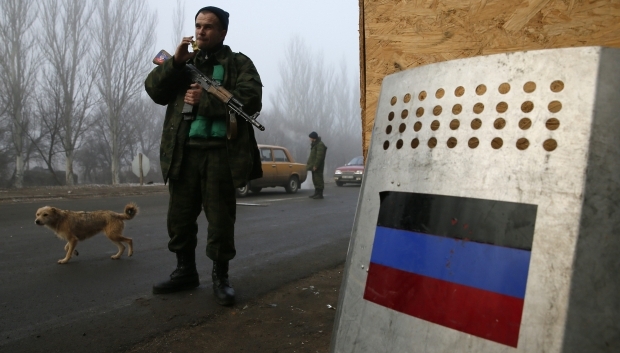
Donetsk, Luhansk Propose Amendments to Ukraine’s Constitution
Publication: Eurasia Daily Monitor Volume: 12 Issue: 93
By:

On May 12, the Russian-controlled Donetsk and Luhansk “people’s republics” (DPR, LPR) jointly presented their proposals for changing Ukraine’s Constitution. Their documents avoid using the terms “DPR” and “LPR,” even as they rapidly consolidate their state structures and armies under Russia’s protection.
From that position of strength they have now forwarded their proposed amendments to the Verkhovna Rada’s (Ukrainian parliament) constitutional reform commission and to the participants in the Minsk Contact Group (Donetskoye Agentstvo Novostey, LuganskInformTsentr, May 12, 13).
The Minsk Two armistice agreement of February 12 had opened the way for this move. The launch of the Contact Group’s Working Groups on May 6 and 12, at Russian and German conjoint insistence (see EDM, May 15), ensures a forum for discussing the DPR-LPR’s amendments to Ukraine’s Constitution, as long as the Verkhovna Rada in Kyiv declines to consider them.
Officially, the “Minsk process” is supposed to define some “special status” for those territories by negotiations between Kyiv and Donetsk-Luhansk. Unofficially, however, it was predictable all along that Moscow and its main Western European partners would use this process to build constitutional obstacles against Ukraine’s Euro-Atlantic and European aspirations. Indeed, Donetsk and Luhansk propose a constitutional amendment to stipulate both nonalignment and neutrality at the same time: “Ukraine does not join military blocs or alliances, maintains neutrality, [and] refrains from participating in military activities beyond its territory.”
That would rule out even mere preparations for joining the North Atlantic Treaty Organization (NATO) in the future (e.g., a Ukrainian membership action plan or some equivalent programs), would preclude Ukraine’s participation in NATO-led peacekeeping missions or military exercises abroad, and make it difficult if not impossible for Ukraine to contribute to the European Union’s common security and defense policies.
Such restrictions have nothing to do with a “special status” for Donetsk-Luhansk self-government. They clearly go beyond the Minsk Two agreement’s letter, attempting to usurp the Ukrainian state’s competencies on foreign policy and defense. The Russian side, however, will undoubtedly try to justify this demand by invoking the goal of “decentralizing” Ukraine. The Minsk agreement and subsequent documents envisage decentralization as part of Ukraine’s constitutional reforms, above and beyond the special status for Donetsk-Luhansk.
While Ukraine is drafting a decentralization policy of its own as a sovereign matter, unrelated to the Minsk process, the Russian side interprets “decentralization” as potentially involving Ukraine’s federalization, confederalization, or even some “common political space,” none of them defined as yet. The components of such a construct, Moscow looks set to argue, should be entitled to blocking powers on whatever remains of the central government’s prerogatives. Russia will undoubtedly use the Minsk process to insert itself and Donetsk-Luhansk into Ukraine’s debates on decentralization.
Donetsk and Luhansk propose supplementing Ukraine’s constitution with a new section on “certain areas with a special status.” The Minsk agreements envisage a “special status for certain areas of the Donetsk and Luhansk provinces [oblasts],” meaning explicitly the DPR/LPR-controlled areas. The amendments just presented, however, are no longer limited to (parts of) the Donetsk and Luhansk oblasts, nor tied to any particular territory. This elastic re-wording seems designed for potential application to other Ukrainian provinces also. Any such special status would apply “without time limitations.”
Under the proposed amendments, the Donetsk and Luhansk entities reserve the right to unite into a single territorial entity, under a common administrative structure of their own.
Any “areas with a special status” would negotiate with Ukraine’s central government to conclude agreements about the delimitation of their respective competencies. These areas would be deemed “inalienable component parts of Ukraine.” As such, the government shall guarantee an (as yet unspecified) quota of financial transfers from the annual state budget, for the socio-economic development of these territories. To that end, the authorities of special-status areas shall participate in working out Ukraine’s state budget. Thus, lip service to Ukraine’s territorial integrity is conditional on Kyiv subsidizing (at this stage) Donetsk and Luhansk. This resembles the position of Russia’s diplomacy. Russia challenges Ukraine to substantiate its territorial integrity by means of financing the DPR-LPR.
The special-status areas shall regulate the management and use of their natural resources (coal is not singled out in the text). They shall form their own police forces (“people’s militias”), with the right to appoint and dismiss the commanders (all independently of Ukraine’s central government). They shall administer justice, within competencies to be delegated from the center to these areas (under a special law to be negotiated by the center with the special-status areas). Their procuracy would form a part of Ukraine’s procuracy system, but the chief prosecutors would be appointed or dismissed jointly with the authorities of special-status areas.
Those areas shall have the right to call and conduct local referendums (hitherto an exclusive prerogative of Ukraine’s central government, on a country-wide basis only). The areas with special status shall have the right to make agreements with foreign countries or their administrative-territorial units; and they shall also be responsible for “trans-border cooperation” (i.e. with Russia), which Ukraine’s central government should “facilitate” (i.e., not interfere).
On those issues and on those foundations, Ukraine’s central government would negotiate to conclude agreements with the special-status areas regarding the delimitation of competencies.
This whole process seems designed to draw Kyiv more deeply into legitimizing the DPR-LPR authorities through negotiations with them. Moscow has pressed all along for direct official negotiations on an equal footing between Kyiv and the DPR-LPR, instead of the semi-official, mediated discussions held in the Contact Group until now. Even if the constitutional negotiations do not produce results, such negotiations would signify political acceptance of the DPR-LPR by Kyiv as well as by the participants in the Minsk and Normandy processes.
The DPR-LPR state structures, their armed forces, and Russian personnel on those territories are unaffected by the proposed constitutional amendments. Those “facts on the ground” will continue for the foreseeable future to exist and develop outside any negotiations between Kyiv and Donetsk-Luhansk. The Minsk and Normandy processes and the Organization for Security and Cooperation in Europe (OSCE), with Russia in the driver’s seat, are not the instruments to deconstruct the “DPR-LPR” and Russia’s military presence therein.




